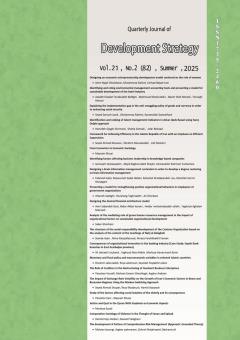The structure of the social responsibility development of the Customs Organization based on the analysis of the content of the teachings of Nahj al-Balagheh
Subject Areas : Culturalsiamk Azari 1 , Nima Ranji jafroudi 2 , Alireza Farokhbakht Foomani 3
1 - Doctoral student of Management Department, Astara Branch, Islamic Azad University, Astara, Iran.
2 - Assistant Professor, Department of Management, Bandar Anzali Branch, Islamic Azad University, Bandar Anzali, Iran.
3 - Department of public administration, BaA.C., Islamic Azad University, International Bandaranzali, Iran
Keywords: development of social responsibility, customs organization, Nahj al-Balagha,
Abstract :
From the perspective of Imam Ali (AS), humans are inherently social beings whose presence in society necessitates the development of social and political responsibilities to effectively contribute to the community. Based on this premise, the present study aims to explore the structure of developing social responsibility within the customs organization through a content analysis of the teachings in Nahj al-Balagha. Given the nature of the subject, this research is categorized as a quantitative content analysis, which is an appropriate approach for understanding the content of texts and extracting key concepts. The statistical population of the study includes the entire Nahj al-Balagha, with the sample comprising all sermons and teachings related to the development of social responsibility. Data collection was conducted using specialized content analysis sheets, and relevant content was extracted from Nahj al-Balagha. To analyze the data, a coding guideline was designed and implemented based on the objectives and focus of the research. The findings revealed five main components of social responsibility, including the ethical dimension, the educational and learning dimension, the leadership and management dimension, the economic dimension, and the legal dimension, which were identified from hundreds of sub-components. Attention to and effective implementation of these components can play a significant role in improving the quality of social responsibility development among individuals in the organization. The results of this study can contribute to enhancing the performance of the customs organization, increasing the social responsibility of its employees and managers, and fostering improved social interactions within the organization.
